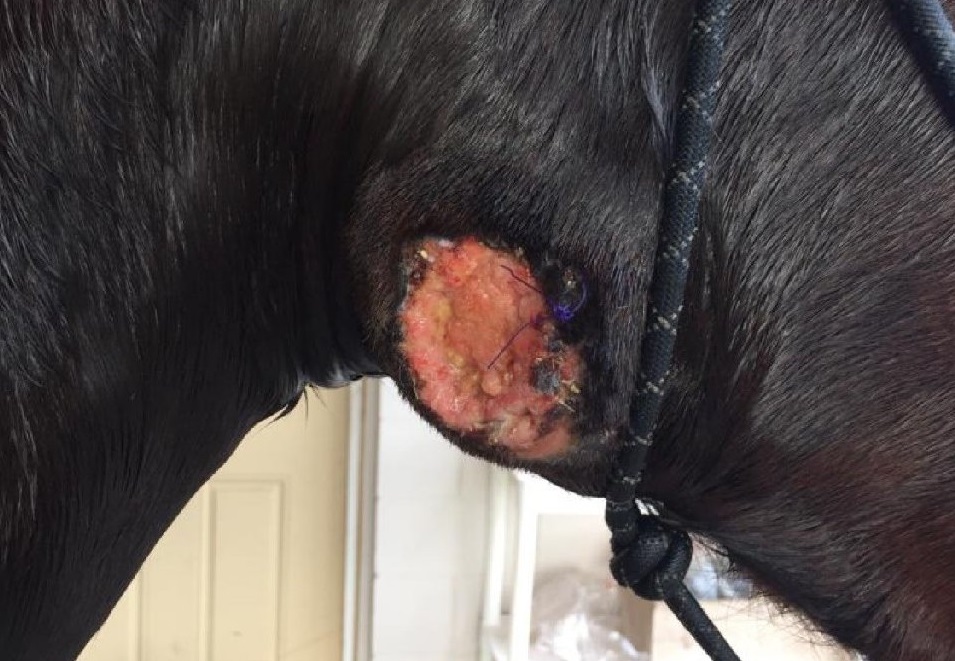Whinny’s Wisdoms

Hey everybody, Whinny here! Although it’s not quite technically summer, the warm weather has arrived in full force in Florida. With the onset of heat, we’ve had an eruption of flies! And once flies begin pestering our horses, we soon run into a common Florida problem: summer sores.
Summer sores are caused by a stomach worm called habronema. Normally, the larvae of the habronema hatch out of horse manure and are picked up by flies. Then, the flies are supposed to deposit the habronema larvae onto the mouth of the horse where they are ingested. Once they are in the horse’s stomach, the larvae are produced and passed back into the horse manure to complete the cycle. That’s a complicated life cycle! Makes me glad I’m a mouse.
This stomach worm usually does not cause any disease or illness when the cycle occurs in the usual way. Summer sores, also known as habronemiasis, develop when the habronema larvae are deposited in the wrong place. The locations include wounds and mucocutaneous junctions, so around the mouth, eyes and genitals.
Classically, summer sores appear as circular wounds that are not healing. They may also be raised or have exuberant granulation tissue, which is colloquially known as proud flesh. In some cases small, hard yellow pieces called sulfur granules are found in the wound. These granules are formed as a calcifying reaction around the habronema larvae because they are not where they are supposed to be. Aggravatingly, these wounds can occur even with the smallest cut or break in the horse’s skin, so prevention is key, otherwise we can end up dealing with a sore all summer long!

The most common mucocutaneous junction that can be affected is the medial canthus, or the inside portion of the eye. Horses are very likely to rub their eyes if they are harboring summer sores there, predisposing them to corneal ulcers. As if horse eyes don’t have enough problems!
Prevention starts with keeping wounds clean and wrapping or covering any wound until it is healed. Pasture management and manure cleanup are also essential in order to minimize the population of flies that are on your farm. During the spring and summer months, horses should really be wearing fly masks to limit their exposure to flies and their likelihood of contracting ocular summer sores. In instances where a wound cannot be wrapped, some creativity may need to be involved or they may need to be stalled with a fan periodically to keep flies off as much as possible.
Although they can be a pain and take time to heal, summer sores are treatable and they do heal eventually, especially once we enter the winter months. Treatment may include surgically debriding wounds, topical treatments or injections with steroids mixed with antibiotics, and oral deworming. Keep in mind that not all dewormers are created equal. Summer sores should be treated with Quest (moxidectin) based on your horse’s weight.
If you suspect your horse has a summer sore give my docs a call! Proper diagnosis is always key in expediting treatment. Summer sores can occasionally be misdiagnosed as squamous cell carcinoma, sarcoids, or pythium, but the veterinarians at Springhill can set you on the right path.
Until next week,
~Whinny
P.S. Have you seen the new YouTube series called Horse Girl Goes to the Vet on our YouTube Channel? I promise you don’t want to miss it! I’ve heard people say the Horse Girl looks a lot like Dr. Lacher’s husband, but I don’t see the resemblance, myself. Anyway, there are way over 100 videos about all kinds of horse health things, much like my blog, and you don’t want to miss out on that great free resource. Your horse will thank you, and so do I!
 Whinny’s Wisdoms is the official blog of Whinny the Clinic Mouse at Springhill Equine Veterinary Clinic in Newberry, Florida. If you liked this blog, please subscribe below, and share it with your friends on social media! For more information, please call us at (352) 472-1620, visit our website at SpringhillEquine.com, or follow us on Facebook!
Whinny’s Wisdoms is the official blog of Whinny the Clinic Mouse at Springhill Equine Veterinary Clinic in Newberry, Florida. If you liked this blog, please subscribe below, and share it with your friends on social media! For more information, please call us at (352) 472-1620, visit our website at SpringhillEquine.com, or follow us on Facebook!
[jetpack_subscription_form title="Subscribe to Whinny's Wisdoms"]

